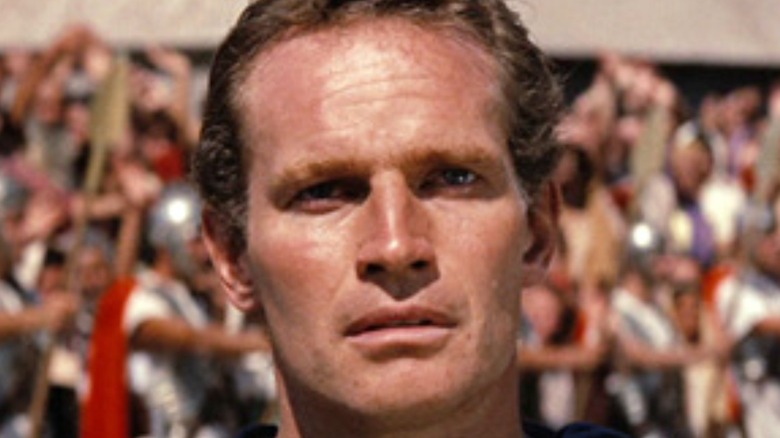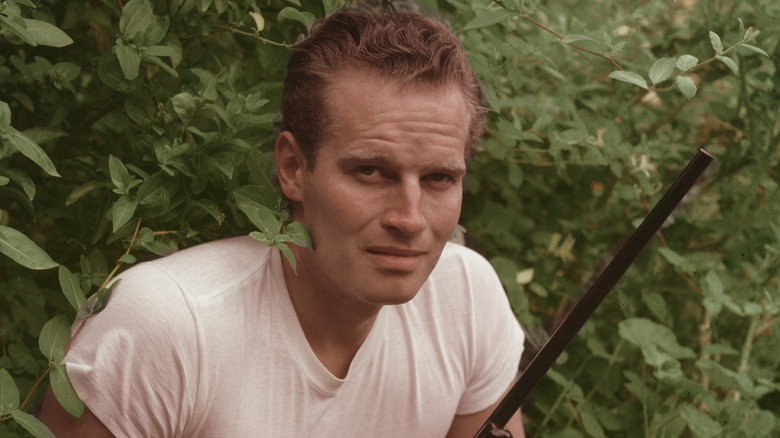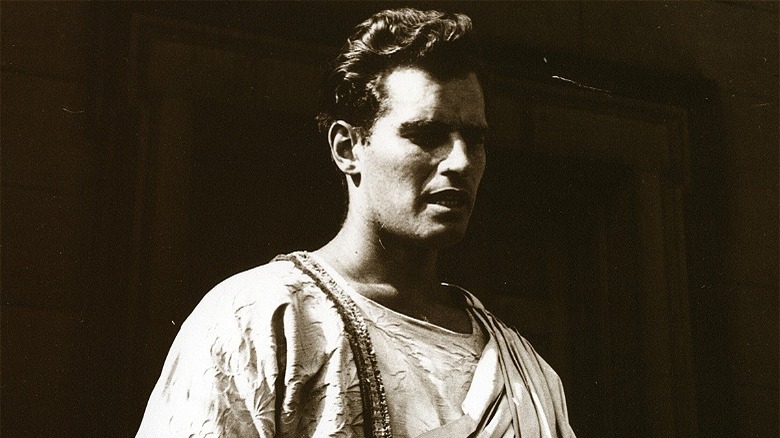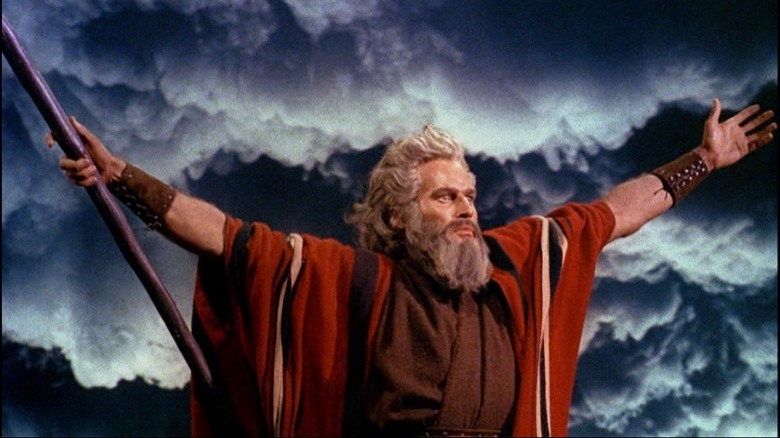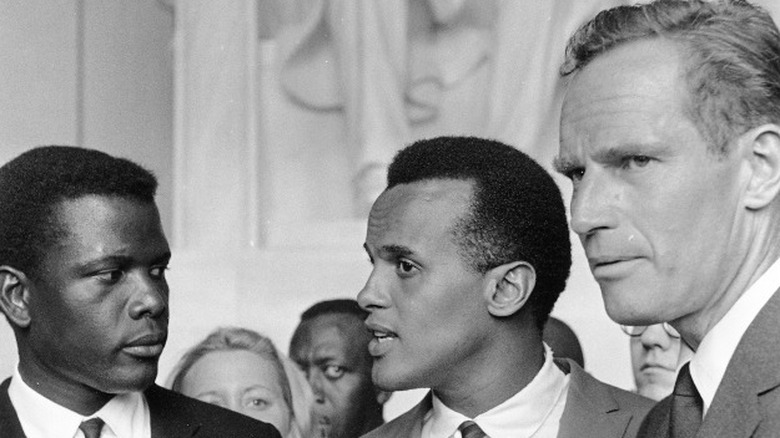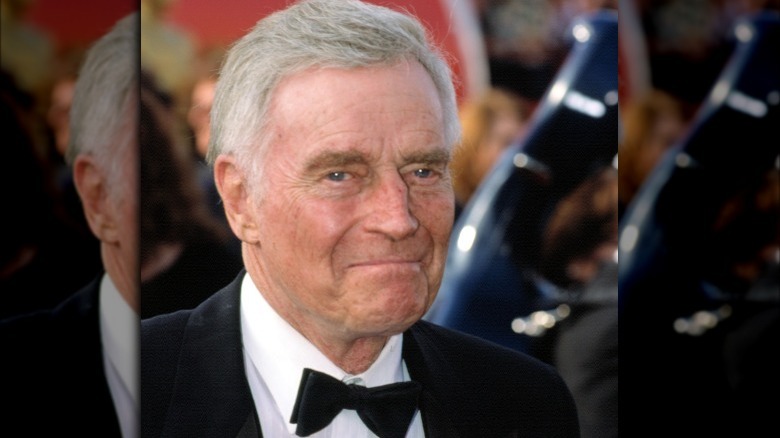Charlton Heston: Things You Don't Remember About The Legend
When Charlton Heston died on April 5, 2008, the world mourned the passing of a Hollywood legend. The complex man had seen a lot of change in his almost 85 years, both personally and in the world. While the actor known for his chiseled features, resonant voice and epic roles gathered a wide range of fans — and detractors — in his lifetime, there was nothing simple about him.
His popularity was global, but he was particularly revered in Japan, where the blog Simply Put notes he was voted "the Japanese movie idol" in 1970. He also had huge popularity in Greece, though there he was billed as Charlton Easton, as Heston in Greek translates to a phrase regarding feces (via The Eye of Faith).
He received many awards during his lifetime, from the Cecil B. DeMille Award in 1967, to the Presidential Medal of Freedom given by President George W. Bush in 2003, and he was honored by the Kennedy Center in 1997 (via The Washington Post). He was both the youngest man to ever have won the Cecil B. DeMille Award at just 43, Hollywood.com writes, and the oldest person to host SNL, appearing on the show in 1993 at the age of 70 (via Oldest).
What's less well known is that Heston was a talented sketch artist, some of which were included in the book "Charlton Heston's Hollywood: 50 Years in American Film," and a small collection of some of his drawings was sold by auction house Bonham's in 2016 for $4,750.
His love of the outdoors started early
Born October 4, 1923 in Evanston, Illinois, John Charles Carter had both an idyllic and challenging childhood. Marc Eliot writes in his book "Hollywood's Last Icon: Charlton Heston," that when he was very young, the family moved to St. Helen in northern Michigan. The rural nature of Michigan's Upper Peninsula appealed to his sense of the outdoors, and he learned to fish and hunt. He said (via CNN), "I'm grateful that I was born in America, that cradle of freedom and opportunity, where a kid from the Michigan Northwoods can work hard and make something of his life."
When Heston was 10, his parents divorced and his mother remarried Chester "Chet" Heston, and moved Charlton and his siblings to Wilmette, just north of Chicago. However, Heston had a hard time fitting in. In "Charlton Heston: The Actor's Life: Journals, 1956-1976," he wrote, "When we moved to Chicago, I was more or less a loner. We lived in a North Shore suburb, where I was a skinny hick from the woods." He missed his father and the rural life in Michigan.
Heston's daughter, Holly Heston Rochell, recounted to Eliot that his mother alone had always called him Charlton — her maiden name — never John, though most people called him Chuck. Changing his last name from Carter to Heston was not Charlton's choice. Rather, his mother informed him one day he was now Charlton Heston, as if to wipe her ex-husband from their lives.
He went from college to war to Hollywood
Heston started performing in plays in high school, according to The Weekly Standard, which led to him receiving a partial scholarship to Northwestern University, where he met his soon-to-be wife, Lydia Clarke.
However, after World War II broke out, Heston enlisted in the Army Air Force in 1944 (via The Vintage News). Heston was deployed to the Aleutian Islands and as a radio operator and aerial gunner, and flew several B-52 missions, though he saw no actual combat. Heston served for two years, then returned home and married Lydia, a partnership that would last until his death in 2008.
Lydia was also an actor, and the newlyweds moved to New York City, The Independent writes, where both were models, as well as performing around the country in various stage performances (via The Guardian). The development of television led to some of Heston's first big breaks, where stage actors took on Shakespearean roles for various TV specials. After landing the role of Proculeius in "Anthony and Cleopatra" on Broadway, Heston was cast as Marc Antony in a televised version of "Julius Caesar," his first television role, which led to his notable performance in the same role in the 1950 movie. That performance caught the eye of director Hal Wallis, who cast him as the lead in "Dark City." The film received poor reviews, but critics commended Heston on his work.
Cecil B. DeMille made him a star
It was a chance occurrence that led to a relationship that would be the springboard for the rest of his career. According to The Weekly Standard, on a quick stop by Paramount to see a few friends, Heston saw renowned director Cecil B. DeMille standing outside his office, and smiled and waved at DeMille as he went by. DeMille was casting his film "The Greatest Show on Earth" at the time, and having seen Heston in "Dark City," was inspired to cast him as the circus manager. That film won the Oscar that year, and Heston's performance received good reviews (via Britannica).
It was his turn as Moses in DeMille's "The Ten Commandments" in 1956 that made him a star, The New York Times reported. It was DeMille's most expensive film to date, and Heston was chosen not only because of his acting skills, and because he was young, tall and strong, but also because he bore a striking resemblance to previous portrays of Moses in paintings and sculpture, particularly Michaelangelo's statue of Biblical prophet in Rome (via The New York Times). Epic in scale, with a running time at three-and-a-half hours long, the movie was a huge success and catapulted Heston into move stardom.
In the years that followed, Heston played many other epic roles, such as the title role in "Ben-Hur" and Michaelangelo in "The Agony and the Ecstasy," as well as starring in pop culture and sci-fi favorites like "Planet of the Apes" and "Soylent Green."
He was an early supporter of civil rights
Heston was involved early on with Dr. Martin Luther King Jr. and the Civil Rights Movement. In 1961, he joined a demonstration protesting a segregated lunch counter in Oklahoma. He also joined other actors, including Marlon Brando, Sidney Poitier, Harry Belafonte, James Garner, and Paul Newman at the March on Washington on August 28, 1963, where King gave his historic "I Have A Dream" speech (via Real Clear Politics).
Before the march, Heston participated in a "Hollywood Roundtable" by the U.S. Information Agency, and when asked why he was marching, replied, "Two years ago, I picketed some restaurants in Oklahoma, but with that one exception, up until very recently, like most Americans I expressed my support of civil rights largely by talking about it at cocktail parties, I'm afraid. ... I could no longer pay only lip service to a cause that was so urgently right, and in a time that is so urgently now." He was also strongly opposed to McCarthyism, The Independent notes, and was against both the Vietnam War and Richard Nixon.
While his politics changed as he aged, later becoming the president of the National Rifle Association and opposing gun control restrictions — views that made him somewhat of a pariah in Hollywood — he actually supported the Gun Control Act of 1968, signed into law by Lyndon B. Johnson (via ThoughtCo.). He stated on "The Joey Bishop Show" that the bill was not to "deny to any responsible citizen his constitutional right to own a firearm. It is to prevent the murder of Americans."
Heston was always heavily involved in support of the arts and charities
Heston was also always a strong supporter of the arts in general, according to The Weekly Standard. He was appointed to President Lyndon Johnson's National Council on the Arts in 1966, as well as serving as co-chairman on Ronald Reagan's Presidential Task Force on Arts and the Humanities.
For his good works and support of many charities and arts institutions, Heston received the Jean Hersholt Humanitarian Award at the Academy Awards in 1978 (posted on YouTube). Bette Davis presented the award to Heston, noting that along with serving six terms as the President of the Screen Actors Guild, he had given his time and energy generously in many different ventures. She stated, "The board of governors has voted him this award because he is one of the most generous gentlemen in the film community. He has been on the National Council of the Arts for six years, and is currently chairman of the American Film Institute and the Center Theatre Group in Los Angeles. He has performed countless services for the Motion Picture and Television Fund, Planned Parenthood, Muscular Dystrophy, The Heart Fund and the American Cancer Society. Chuck Heston has not done any of these things for recognition or credit. It's just the way he is: a man of conscience. And to boot, a darn good tennis player, who turns even that hobby into charity."
